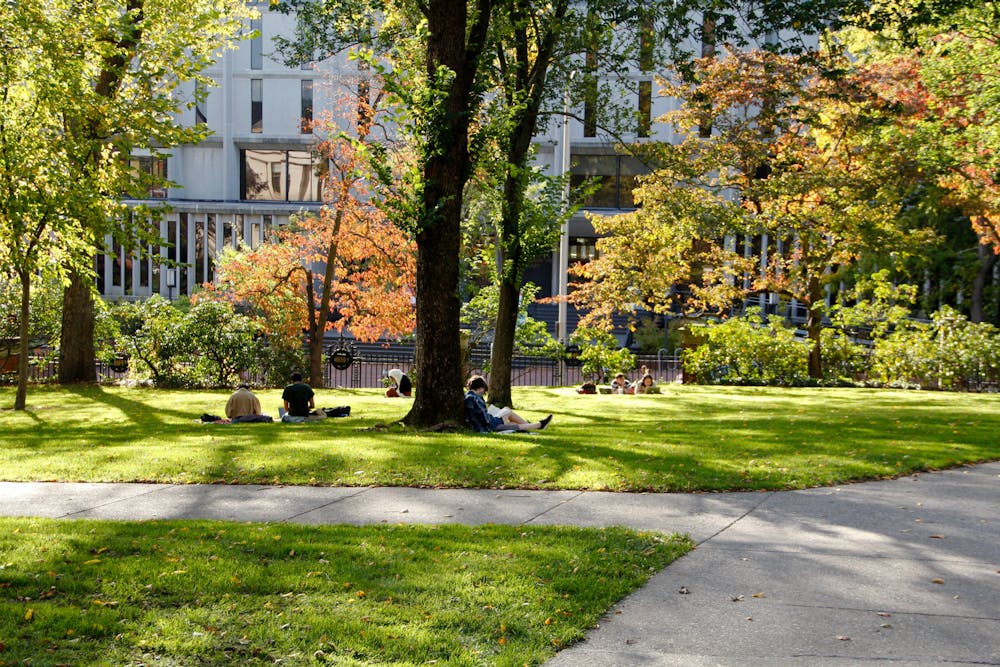After taking a hiatus last semester to evaluate its “work and capacities,” Decolonization at Brown is rebuilding its activism efforts within a newly restructured organization. The group “seeks to bring together students, staff, faculty and local communities to work towards decolonizing Brown’s relationships, academics and spaces,” according to its informational pamphlet.
The organization is also “dedicated to making sure the Indigenous histories of (the University and Providence) … are properly conveyed and represented,” said Shazain Khan ’24, a member of DAB’s steering committee and a coordinator for the group’s restructuring.
One of DAB’s current initiatives is the Carte Blanche task force, a decolonial magazine and podcast headed by Maha Temre ’25. According to DAB’s pamphlet, “carte blanche” — which translates to “white card” — implies “a complete freedom to act as one wishes.”
Temre said that this title “embodies the spirit of the project,” which aims to offer “complete freedom to finally speak about topics that are not spoken about enough, especially in the media.”
Temre first had the idea for the project this past summer, and she later reached out to DAB, which has provided funding for its further development. The project focuses on how colonialism affects not only “our daily lives” but also “our minds,” she said.
“That gives us a foundation to be able to speak about a variety of topics, such as language, gender (and) mental health,” Temre added.
Khan and Cami Regalia ’24, who leads the Colonialism in STEM task force, also both expressed interest in reviving a past DAB event titled “What is This Place?” The event served as an educational opportunity for University students to learn about the institution’s colonial history and ties to the slave trade. They also hope to strengthen the organization’s anti-misinformation task force, which aims to share information about the histories of Providence’s Indigenous communities and how they were impacted by settler colonialism.
“I don’t want to speak for what DAB could be, because I want DAB to be what the community needs it to be,” Khan said. “My hope is for DAB to revive that energy, that enthusiasm, that motivation to change and enact change because it’s important work.”
“I think the priority is just going to be whatever seems to be the most pressing issue in the needs of the student body and the community,” Regalia said.
Historically, DAB has had a steering committee that helps oversee the administrative duties of the group’s various task forces and projects, Khan said.
Previously, students could apply to the steering committee without being involved in the task forces. But according to Khan, this led the steering committee to be “a little bit out of touch” with the ongoing projects in the organization. The new steering committee will now include the co-leads and leads of the various task forces in order to ensure they have “a voice” in the club’s guidance, he explained.
Khan added that the group hopes to restructure its general body meetings “as an opportunity for (different) projects to interact with each other” and collaborate more effectively with one another.
In past years, Decolonization at Brown joined other activist groups to encourage the University to adopt a land acknowledgement, Regalia said. The group's land acknowledgement task force focused on educating the campus about land acknowledgements and helped campus organizations craft their own.
DAB also previously launched an initiative to remove two statues of the Roman historical figures — Caesar Augustus and Marcus Aurelius — from their locations on Brown’s campus.
“These statues are one part of a broader colonial project,” wrote Belinda Hu ’23 in a Nov. 1, 2020 op-ed in The Herald on behalf of DAB. “The Europeans who began colonization in North America cited Ancient Rome as a guiding example for their colonial mission on Native American lands. Later, the founders of the United States would do the same, claiming Ancient Rome as part of a lineage of European civilization,” Hu wrote.
“The Roman statues on Brown’s campus directly invoke and embody this power dynamic, celebrating the continued domination of Native land and peoples by the West,” Hu continued.
The initiative received endorsements from more than 40 campus organizations. Regalia told The Herald that the initiative is currently on pause as the group facilitates a “broader discussion” about its strategy.
Regalia also discussed the origins and current initiatives of the Colonialism in STEM task force. “A lot of the times when we talk about … decolonization and investigating colonialism, we discuss it in terms of humanities topics,” Regalia said. But colonialism is “so ingrained in STEM itself,” she added.
Last year, the task force held meetings with professors in STEM departments and helped reshape class syllabi to reflect the legacy of Colonialism in STEM fields. The task force “focused on working with professors … (and) the community around us and seeing how STEM has been used as a way to reinforce colonial natures and mannerisms — and trying to break that down,” Regalia added.
Jennifer Shim is a University News editor overseeing the staff and student labor beat. She is a sophomore studying Applied Math-Economics. Outside of The Herald, you can find her playing NYT Connections.





